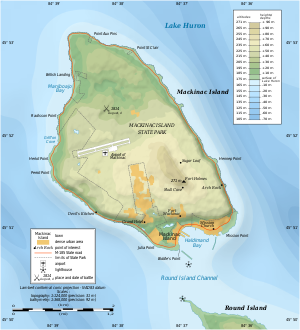Battle of Mackinac Island
| Battle of Mackinac Island | |||||||
|---|---|---|---|---|---|---|---|
| Part of the War of 1812 | |||||||
 Topographic map of Mackinac Island. Crossed swords pinpoint the location of the battle in 1814 |
|||||||
|
|||||||
| Belligerents | |||||||
|
Native Americans |
|
||||||
| Commanders and leaders | |||||||
|
Robert McDouall Robert Dickson |
George Croghan, Andrew Holmes† Arthur Sinclair |
||||||
| Strength | |||||||
| 150 Native Americans, 140 regulars, 25 militia (untrained) |
700 | ||||||
| Casualties and losses | |||||||
| 1 dead, 1 wounded |
13 dead, 55 wounded |
||||||
Coordinates: 45°51′11″N 84°37′03″W / 45.853056°N 84.6175°W
The Battle of Mackinac Island (pronounced Mackinaw) was a British victory in the War of 1812. Before the war, Fort Mackinac had been an important American trading post in the straits between Lake Michigan and Lake Huron. It was important for its influence and control over the Native American tribes in the area, which was sometimes referred to in historical documents as "Michilimackinac".
On 18 July 1812, a mixed force of British regular soldiers, Canadian voyageurs and Native Americans captured the island in the Siege of Fort Mackinac before the American defenders knew that war had been declared. The news of this success influenced many more Native tribes who had previously been neutral or undecided to rally to the British cause, contributing to several more British victories over the next year. The British meanwhile abandoned their own defences at St. Joseph Island and concentrated their forces at Mackinac Island.
For the rest of the year and through much of 1813, the British hold on Mackinac was secure since they also held Detroit, which the Americans would have to recapture before attacking Mackinac. Then on 10 September 1813, the Americans won the decisive naval Battle of Lake Erie, which allowed them to recover Detroit and defeat the retreating British and Native force at the subsequent Battle of the Thames. Although it was too late in the year to allow the Americans to mount an expedition to recover Mackinac before the lakes froze in winter, they had nevertheless cut the British supply lines to the post. The British garrison, commanded by Captain Richard Bullock of the 41st Regiment of Foot, were placed on half rations and also procured some fish and maize locally but were suffering severe shortages by the end of the winter.
...
Wikipedia
